When you’re searching for a place to call home, one of the most important aspects to consider is your compatibility with an area’s culture and values. In a nation as diverse as the United States, attitudes on a wide array of social issues can vary significantly from coast to coast, and Americans frequently choose to live near those who agree with them on important personal ideals.
As part of our series looking at the Best Places to Live, we decided to look at the language Americans use when tweeting about different races, ethnicities, genders, religions, and sexual orientations. Where are the most racist cities in America? Where did tweets trend toward neutral or positive language – terms that aren’t typically accompanied by negative connotations – and where was bigoted or historically mean-spirited terminology more common?
We looked at terms that run the gamut from P.C. to just plain prejudiced, and we found over 12 million tweets from June 2014 to December 2015 – more than enough to tell a fascinating story of American attitudes across the nation. Where possible, we attempted to analyze the results within local context, as interpreting these findings requires attention to regional events, trends, and culture. Keep reading to discover which states are tweeting the most about their social viewpoints – for better or worse.
A National Look At Derogatory And Prejudiced Language
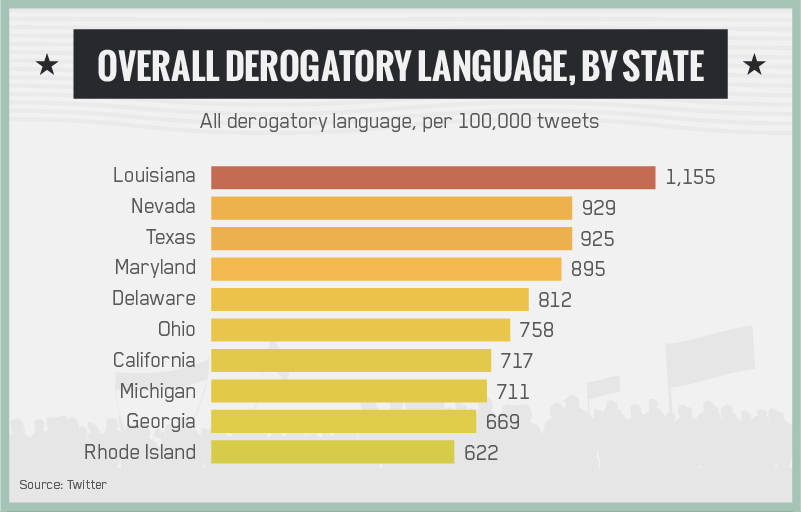
Before breaking down our analysis into different categories of language, we took an overall look at the state-by-state usage rates of all derogatory language included in our study. This includes slurs and other prejudiced language against black people, Hispanic/Latino people, women, gays and lesbians, transgender people, people with disabilities, and the overweight.
Altogether, Louisiana places first with 1,155 slur-containing tweets out of every 100,000, indicating that approximately 1 in 87 tweets originating from Louisiana over the studied time period contained at least one of these slurs. In second is Nevada with 929, and Texas is nearly tied with 925 such tweets per 100,000.
These high-ranking states are geographically diverse. Not only are Gulf Coast states like Louisiana and Texas represented, but also Northeastern states such as Maryland, Delaware, and Rhode Island, as well as Ohio and Michigan in the Midwest and California on the West Coast.
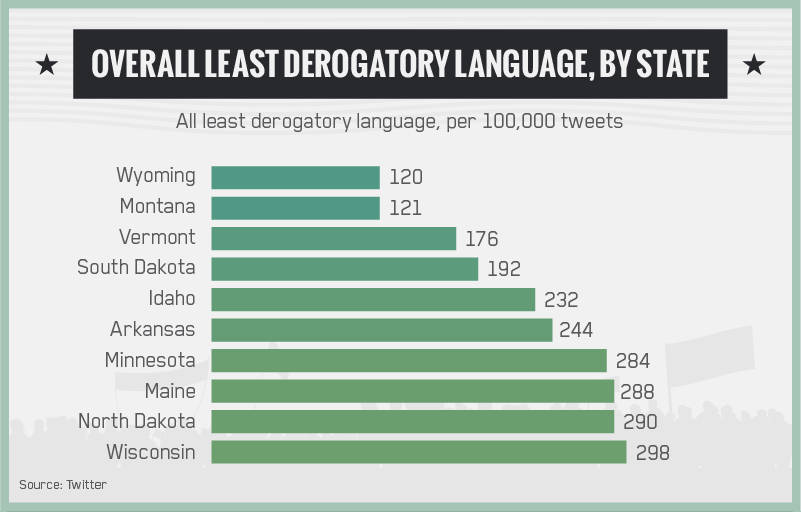
Not all states were so vocal in their use of slurs and pejorative language. Ranking last in the nation, Wyoming used these terms in only 120 per 100,000 tweets – barely a tenth the rate of top-ranking Louisiana. Neighboring Montana, with 121, is nearly tied for last place.
Other Western and Midwestern states, such as South Dakota (192), Idaho (232), Minnesota (284), North Dakota (290), and Wisconsin (298), appeared among the bottom 10 as well. Southern and Northeastern states like Arkansas (244), Vermont (176), and Maine (288) also had some of the lowest levels of derogatory language use. As with the states that used these terms the most frequently, these states are spread across the nation. We’ll take a closer look at what kind of language is being used the most in these states and others, and see which patterns emerge.
Anti-Black Slurs
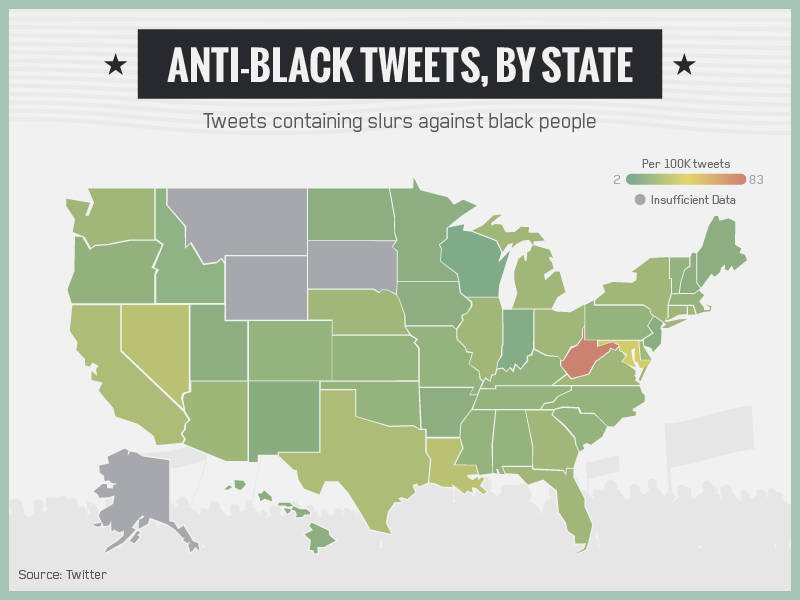
In terms of open expressions of prejudice, it doesn’t get much more obvious than publicly using racial slurs against black people. We searched Twitter for instances of several slurs, including the N-word. One positive sign is that, in absolute numbers, openly tweeting these anti-black slurs is an uncommon behavior. Over the time span of June 2014 to December 2015, most U.S. states made tweets containing these slurs merely hundreds of times.
However, the difference in usage rates among states is striking. West Virginia shows the highest rate by far, with 83.2 per 100,000 tweets containing these slurs. In second and third place are Maryland and Louisiana, with 36.5 and 31.3 per 100,000. Excluding states with very small sample sizes, Idaho places last with 2.4 tweets per 100,000, followed by Maine with 2.7.
How well do these statistics represent actual anti-black sentiment in a given area? A 2015 study of regional Google searches for the N-word showed very high levels of searches in most parts of both West Virginia and Louisiana as well as low levels in Idaho and Maine. But for a more complete view of these trends, we’ve also taken a closer look at the city-level data.
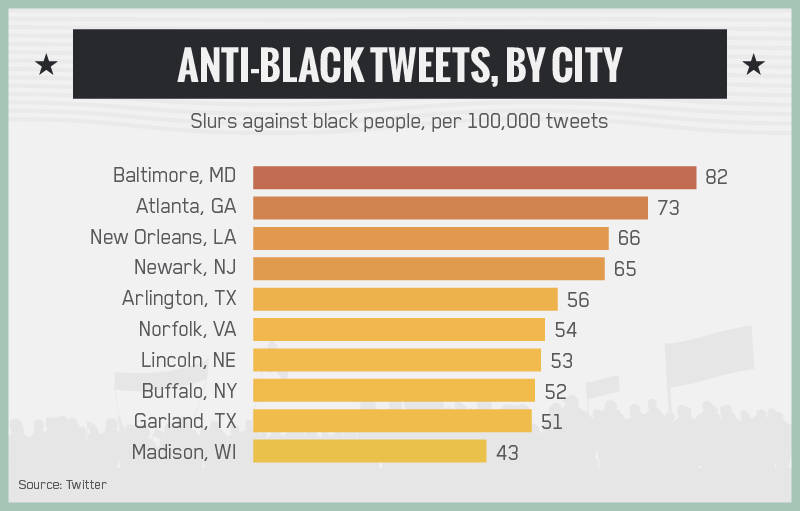
Looking at the top cities for usage rates of these slurs, one trend is clear. The most highly ranked cities – Baltimore, Atlanta, and New Orleans – are also those with some of the highest proportions of black residents.
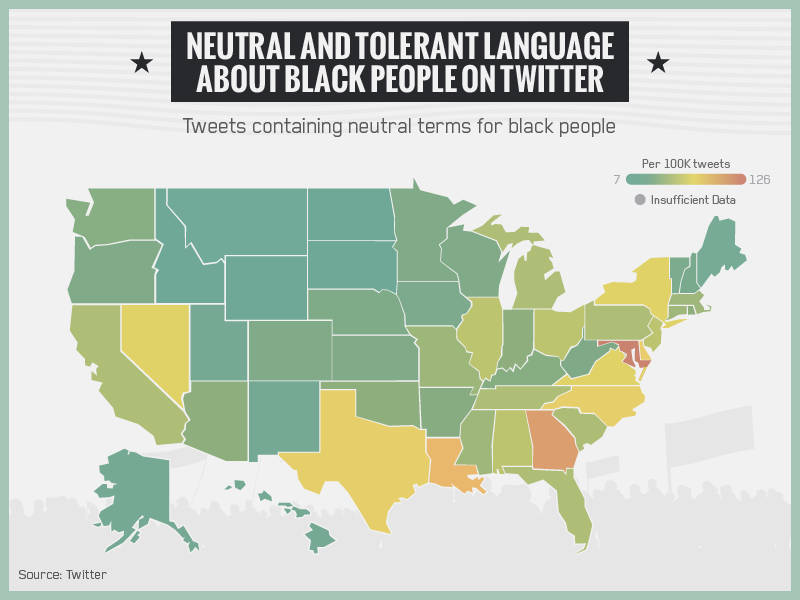
When we look at the usage of more neutral language in tweets, such as “black people,” “black person,” and “African American,” a complementary picture emerges. The states with the highest rates of usage – 125.7 per 100,000 tweets for Maryland, followed by Georgia and Louisiana – also have some of the biggest black populations. In general, states with the most black people appear to show the most usage of neutral language for black people. Meanwhile, Wyoming and South Dakota – states with extremely low populations of black people – exhibit the lowest frequency of neutral-language tweets (perhaps the most racist cities), at merely 7.2 and 8.4 per 100,000.
Trends in Anti-Hispanic/Latino Language
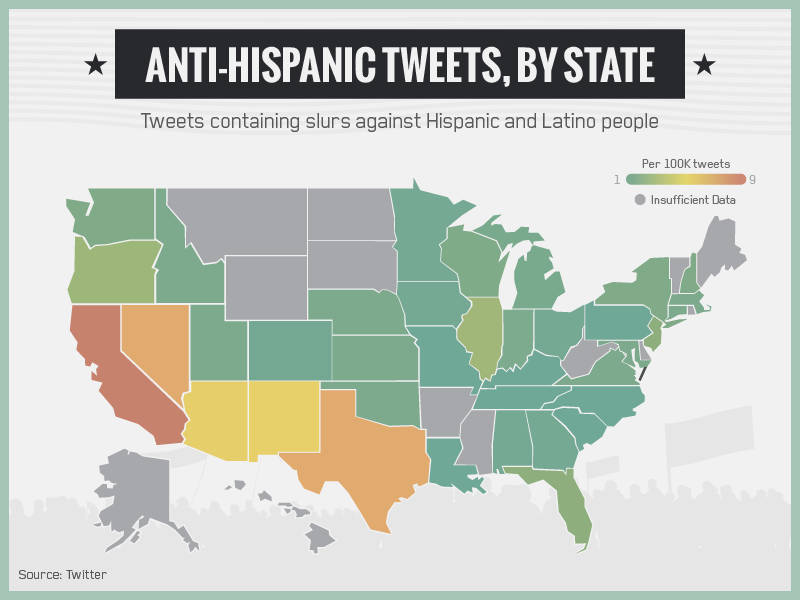
We also tallied up the usage of anti-Hispanic/Latino slurs in tweets to dive deeper into the most racist cities. Similar to anti-black language, these terms were somewhat rare overall, occurring only in the double or triple digits for most states. Those states that did rank the highest – California at 8.7 slur-containing tweets per 100,000, followed by Texas, Nevada, Arizona, and New Mexico – exhibit a clear pattern: They’re also the top five states with the largest Hispanic/Latino proportion of their populations. In recent years, these states have been at the epicenter of controversies over undocumented immigration from Mexico and Central America. At the same time, states with low Hispanic/Latino populations such as Maine, Montana, and West Virginia were also among the lowest for prevalence of anti-Hispanic language in tweets. Because anti-Hispanic slurs have largely not been reclaimed by Hispanic and Latino people in the way that the N-word is commonly used in black communities, it’s more likely that the usage of these anti-Hispanic slurs reflects actual racial hostility.
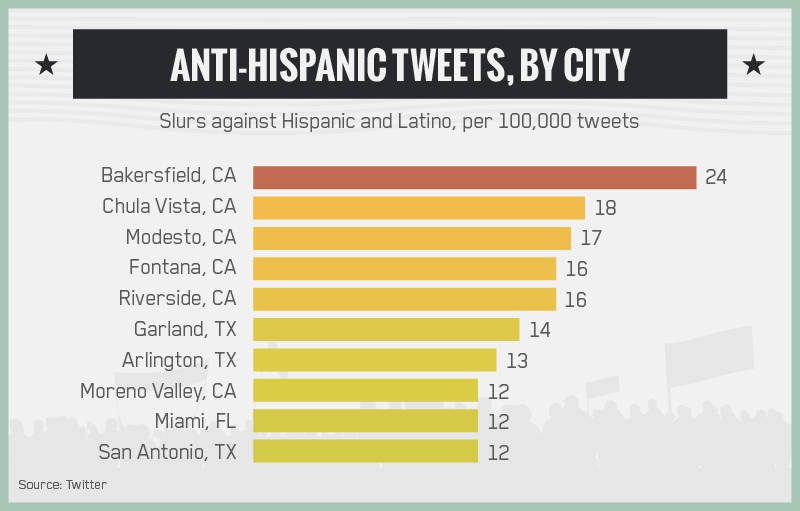
But these states don’t necessarily show a uniform level of racist language use. California does contain the five cities with the highest usage of anti-Hispanic slurs: Bakersfield at 24, followed by Chula Vista, Modesto, Fontana, and Riverside. But it’s also home to low-ranking Oakland (three), Irvine (four), and Sacramento (four). Texas is likewise host to a patchwork of cities with a wide range of usage rates for these slurs.
Sexist Sentiments
With Hillary Clinton a major contender in the 2016 presidential race, much attention has recently been given to the prevalence of sexist attitudes across the country. We’ve tracked the usage of derogatory terms commonly used in reference to women on both the state and city level to see how often residents of different regions openly use these words on Twitter.
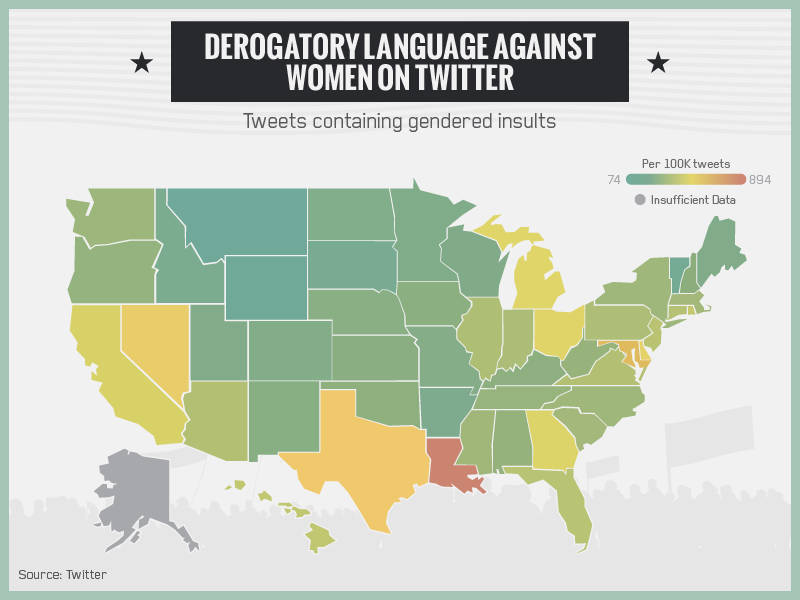
Louisiana ranks first in the country for usage of derogatory language against women with 894 uses of these terms per 100,000 tweets, and as we’ll see, this is largely due to the influence of two major cities. In second place is Texas with 659 uses per 100,000, and Maryland comes in third at 650. However, these figures included uses of the word “bitch,” which is commonly used as profanity but not always with sexist intent. When this term is excluded from our analysis, the rankings show a dramatic shift.

Excluding “bitch” changes the landscape of sexist slurs drastically. Nevada is now in the lead with 133 uses of other sexist terms (such as “twat” and “cunt”) per 100,000 tweets. Given that the adult film industry in the United States has largely relocated from California to Nevada due to more favorable laws, it’s possible that such terms are more frequently being used in promotional materials. New Hampshire (121), Rhode Island (115), and Ohio (114) also rank highly.

Among cities across the nation, New Orleans ranks first for usage of all sexist language (including “bitch”), with 3,696 tweets per 100,000. Atlanta ranks second with 3,212, and Louisiana continues to be strongly represented as Baton Rouge places third with 2,698. Other notable appearances include Houston, TX (2,353) and Baltimore, MD (2,323). As seen among the states, omitting “bitch” and focusing on the remaining slurs results in a somewhat different picture of sexist language use by America’s cities.

With the exclusion of “bitch,” Atlanta rises from second place to first – but it’s rate of usage is reduced by more than half, to 1,580 per 100,000 tweets. Newark, NJ rises from eighth place to second, while New Orleans falls from first place to fourth. Uses of “bitch” accounted for more than two-thirds of New Orleans’ unadjusted rate of derogatory language against women, which drops to 1,145 when this is omitted. Yet even with this more narrow set of terms, tweets including language against women are some of the most common out of all categories studied.
Expressions of Homophobia
Both social and legal attitudes toward the gay, lesbian, and bisexual community have undergone a significant shift in the United States in just the past few years. But how common are expressions of homophobic language even now? We analyzed the prevalence of several anti-gay and anti-lesbian terms in tweets from cities across the country.

Compared with the usage of slurs in other categories, anti-gay language remains commonplace. Buffalo, NY leads with 168 slur-containing tweets per 100,000 tweets, but this number is hardly extraordinary compared with runners-up Arlington, TX (161), Riverside, CA (158), Fontana, CA (155), and Lincoln, NE (141). Rounding out the top 10 are Bakersfield, CA, Modesto, CA, Oxnard, CA, New Orleans, LA, and Corpus Christi, TX.
Many of these states – Texas, Nebraska, and Louisiana – show a level of support for legal gay marriage that’s lower than the national average. However, even traditionally liberal urban areas such as Los Angeles and San Francisco show levels as high as 86.2 and 49.6 per 100,000 tweets, respectively. It’s uncertain how much this may reflect more neutral in-group reclamation and use of terms such as “fag,” “dyke,” and “lesbo.”
Transgender Language
Transgender people, historically an obscure and not widely known group, have increasingly received media coverage throughout 2014 and 2015. While major events such as the coming out of Caitlyn Jenner in 2015 drew attention to the experiences of transgender people in society, much of the public remains unfamiliar with the proper language preferred by trans people. Widespread usage of terms such as “tranny” and “she-male” is still somewhat common, even though these words are generally considered slurs by the community.
Across the country, Nevada comes in first by far, with 27.6 tweets containing anti-transgender slurs per 100,000 – more than three times greater than the runner-up. This may be due to the same effect seen among sexist language: As a national hub of the adult film industry, tweets originating from there could more often be using these traditionally negative terms in a promotional and marketing context. When Nevada, a clear outlier, is omitted, a more detailed picture emerges.
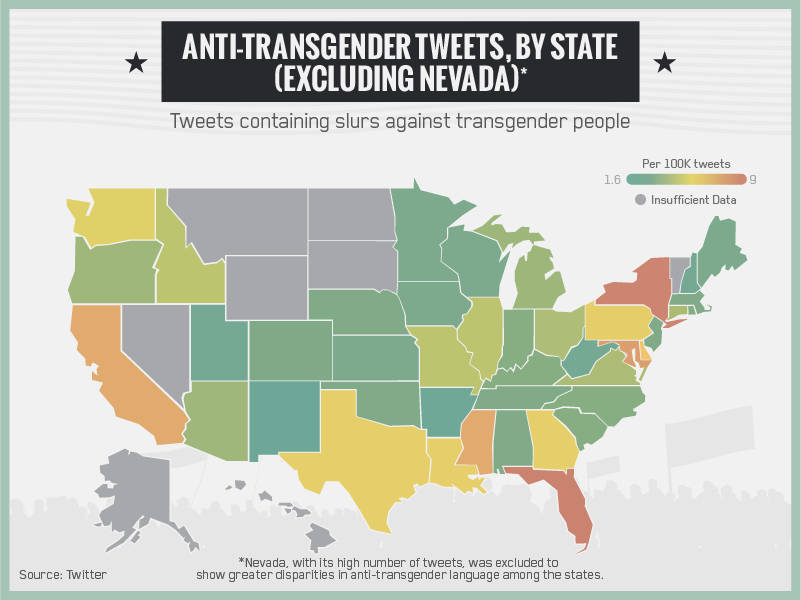
Excluding Nevada, New York now ranks first with 8.8 slur-containing tweets per 100,000, followed by Florida with 8.6. Maryland (eight), Mississippi (7.7), and California (7.3) also placed highly. California and New York are often at the vanguard of LGBT rights and activism, and a study from the U.S. Census Bureau estimates that these states are home to a significant transgender population. These states could be home to greater discussion of these issues, including discussions with negative terms. A city-level look at these trends reveals the different patterns seen in each state.
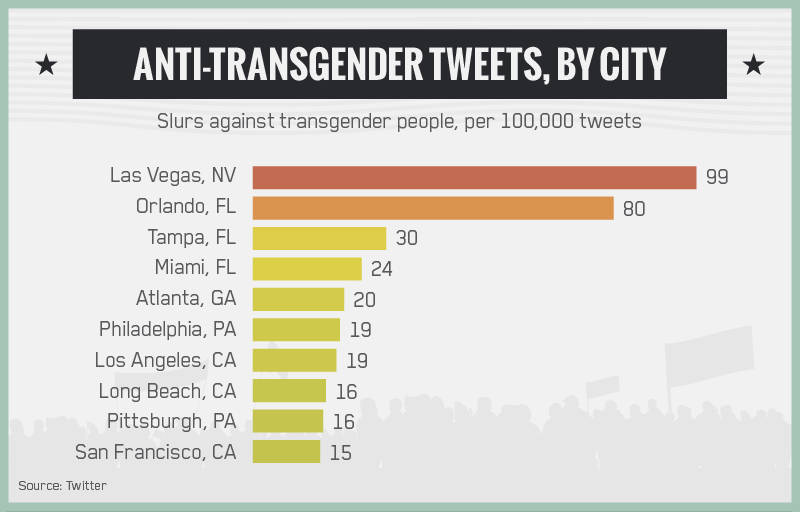
Las Vegas (99 per 100,000) is responsible for nearly all recorded anti-transgender tweets in Nevada, further suggesting a link to increased usage by the adult industry. Interestingly, no cities in New York stood out for their usage of negative language in tweets, suggesting that such tweets may be more diffuse. Florida, however, shows a highly localized pattern: Orlando is second in the nation with 80 such tweets per 100,000, followed by Tampa with 30 and Miami with 24.
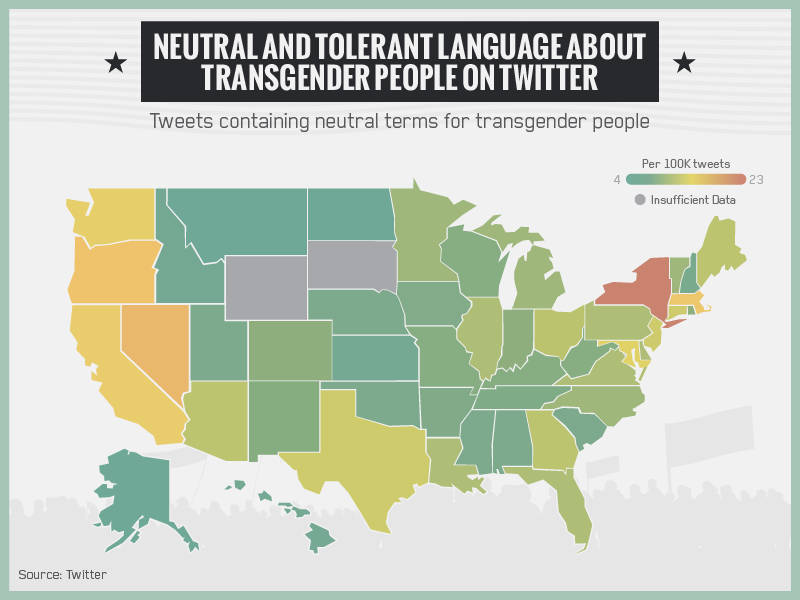
Repeating a trend seen in previous maps, some of the states with the most usage of anti-transgender language on Twitter also show some of the highest usage of neutral language such as “transgender,” “trans person” and “trans people.” New York places first in the nation with 23 tweets containing neutral terms per 100,000, with runner-up Nevada having 18.7. Following are Oregon (17.5), Massachusetts (16.4), California (15.8), and Washington state (14.8). Overall, much of this neutral or positive language originated from states with relatively high estimated transgender populations. Conversely, states with low transgender populations, including much of the interior West, Midwest, and South, showed low levels of both slur-containing and neutral-language tweets.
Discussing Disability
Insults like the noun “retard” or the adjective “retarded” are often used casually, without much thought to their origin with dated terminology such as “mentally retarded” for intellectual disabilities. In recent years, many major organizations including the Special Olympics have spoken out against the pejorative usage of words like “retard” and “retarded,” branding them as “the R-word.”
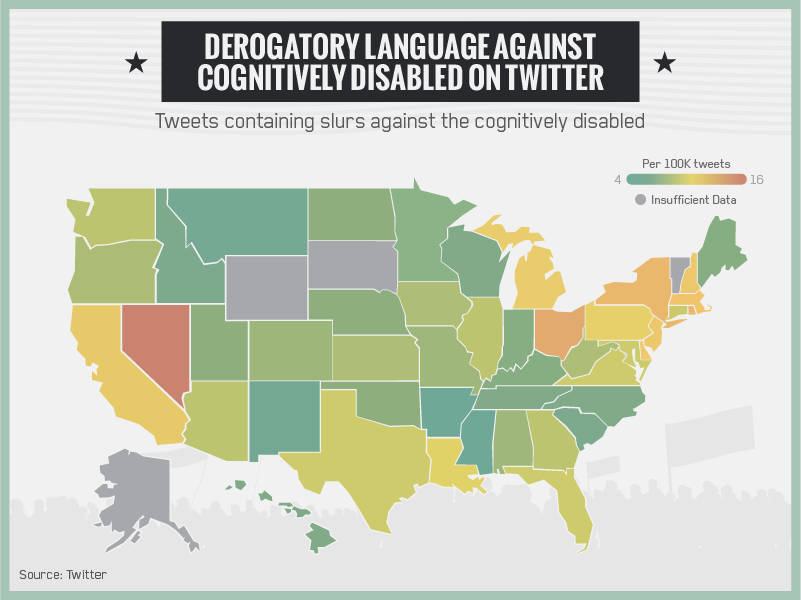
Use of “retard” in tweets is most common in Nevada with 16.4 such tweets per 100,000, followed by Ohio with 14.1. New York (13.8), Massachusetts (12.8), and New Jersey (12.3) ranked highly as well. The lowest rates of tweets containing this language were seen in Mississippi (3.5), Arkansas (3.7), and Montana (4.2). Although these rates don’t strongly correlate with states’ percentages of learning-disabled students or children with elevated blood levels of lead, high-ranking Ohio does show a greater proportion of students with learning disabilities (4.2%), while Arkansas has a lower proportion (0.8%). However, given that serious discussions of intellectual disabilities are unlikely to feature outdated terms like “retard,” it’s likely the case that these words are mostly being used as insults.
Obesity and Overweight: Negative and Neutral Terms
While obesity is highly prevalent in the United States, many media outlets have drawn increasing attention to movements for body positivity and acceptance, as well as the issue of stigma against overweight people. This fat-shaming can take the form of language such as “fattie,” “fatso,” and “fatass.”
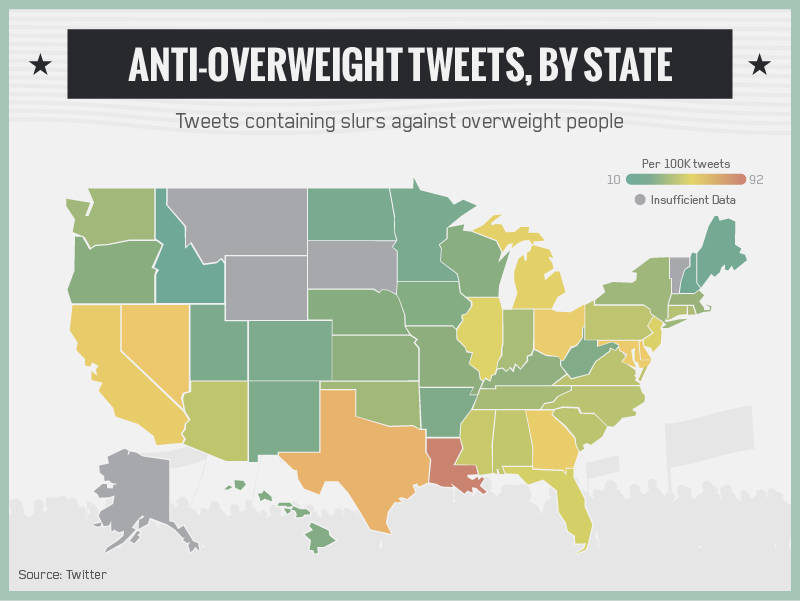
Tweets with anti-overweight language occur in an eclectic pattern: Louisiana leads with 91.6 per 100,000 tweets, followed by Texas with 72.7 and Nevada with 61.1. Next are Delaware (58.8), Maryland (57.8), Ohio (56), and California (54.5).
Curiously, these tweets show a mixed relationship to the actual obesity levels recorded in each state. While Louisiana, Texas, Delaware, and Ohio exhibit moderately high obesity rates, California has one of the lowest rates in the country, and Nevada and Maryland show only moderate levels of obesity. Mississippi, Arkansas, and West Virginia all experience high rates of obesity, but tweeted anti-overweight language very infrequently. Additionally, residents of Texas, Nevada, and California report frequently exercising at rates higher than the national average, yet residents of Louisiana, Delaware, Maryland, and Ohio exercise at lower rates. Overall, the use of disparaging language for overweight people in a given state doesn’t appear to be related to the presence or absence of the overweight and obese, nor does it clearly relate to a state’s reported levels of physical activity.
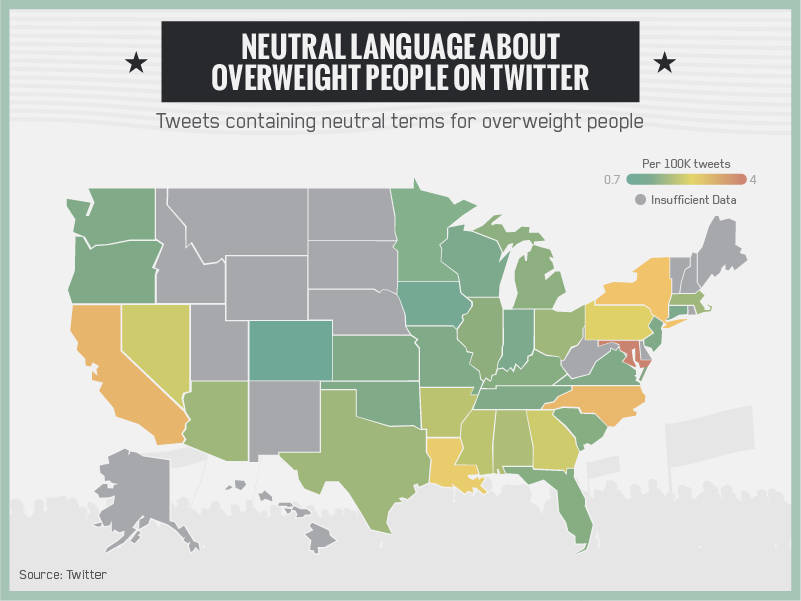
We also counted usage of more tolerant language toward overweight people, such as “people of size,” “person of size,” and “plus size.” Maryland (3.8), California (3), North Carolina (3), New York (2.9), and Louisiana (2.6) make the top five for tweets using this more neutral language, which is notably much less common than fat-stigmatizing language. However, with the exception of Louisiana, none of these states exhibit particularly high levels of obesity – or rates of frequent exercise.
Finding a Home That’s Right For You
While the scale of hostility expressed openly on Twitter can be troubling to think about, there are many positive signs as well, such as the relative rarity of certain slurs and how they’re often eclipsed by more tolerant language. When community values can vary so widely across the nation, you deserve a home, or mobile home for sale, that fits who you are and what you cherish. At Rentable.co, we can help you find local apartments that meet your needs. With over a million to choose from, the options are almost limitless. Visit Rentable to find an apartment near you to rent.
Methodology & Sources
Download PDF here
Fair Use
You’re welcome to share the images found on this page freely. When doing so, please attribute the authors by providing a link back to this page so your readers can learn more about this project and the related research.
